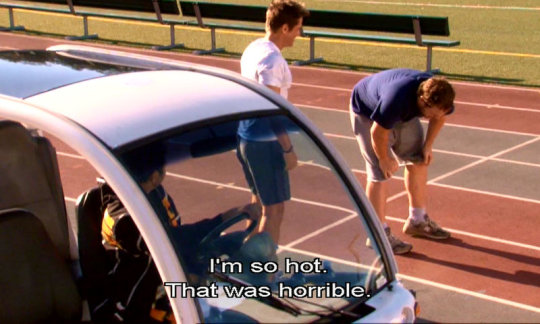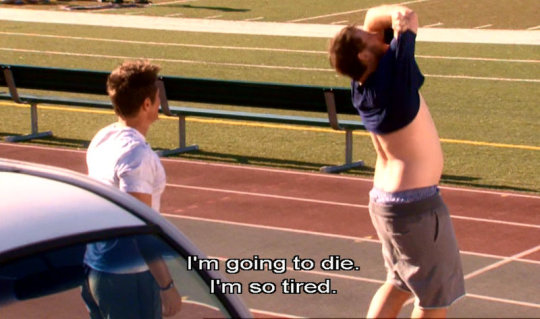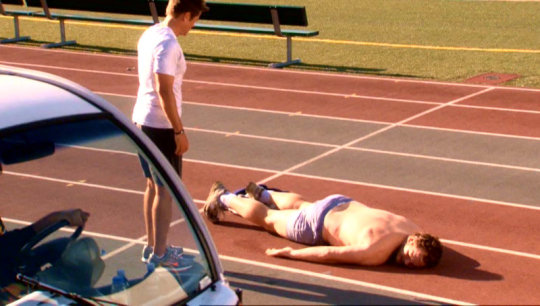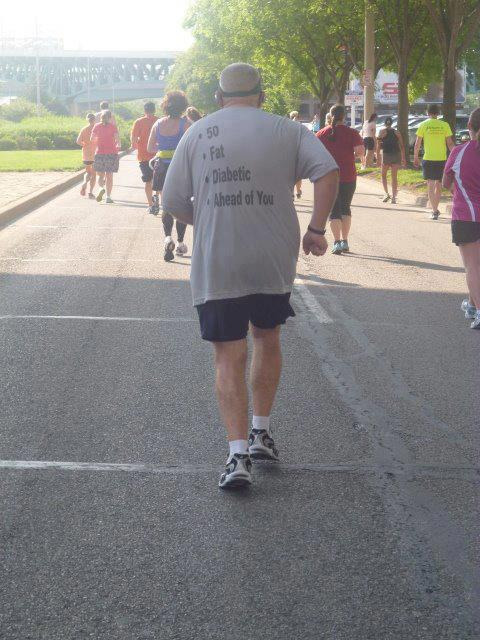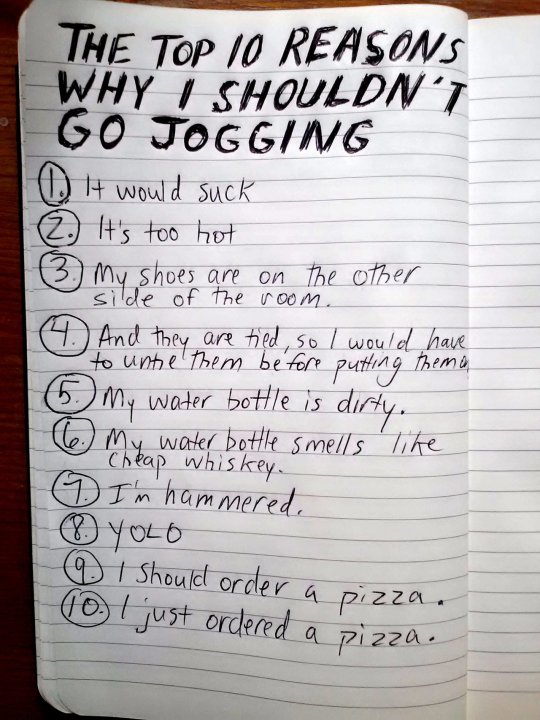Don't wanna be here? Send us removal request.
Photo
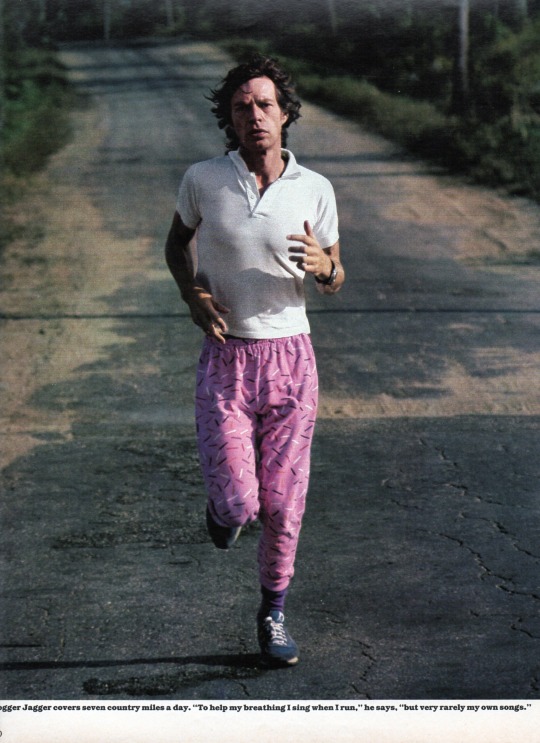
Jogger Jagger covers seven country miles a day. “To help my breathing I sing when I run,” he says, “but very rarely my own songs.”
Mick Jagger
from the magazine LIFE, November 1981
Jochem Grin tumblr / website
119 notes
·
View notes
Text
Paras10
Today I ran 10.7 miles carrying 50lbs [over a third of my body-weight] in 2:10:34.
That’s like carrying your 7 year-old nephew on your back
Was going good guns until the 8 mile 1:40 mark. Passing by my house was a sickener - the bargain-hunter brain whispering “You could be sitting down with a beer now, or in bed. No-one is watching, no-one cares, it could all be over now, just turn right…” - I was sapped after that - less running, more plodding.
1 note
·
View note
Photo
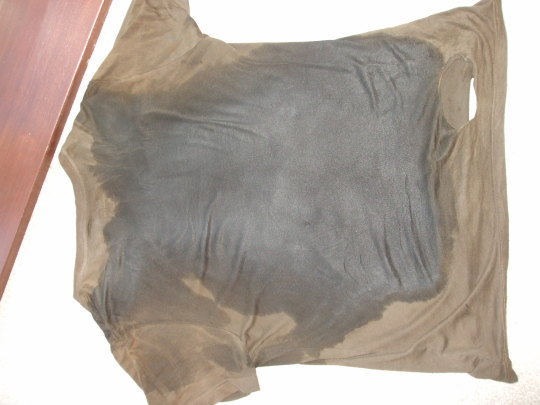
What a lovely day for a-N 8 MILE TAB, GET UP THAT HILL YOU JESSE, FUCKING SHIT GO GO GO NOW FUCK NOW
0 notes
Photo
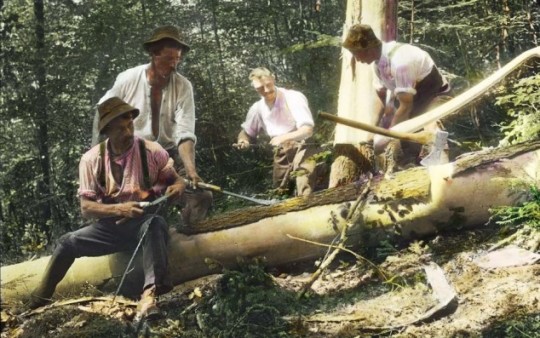
I have books on chopping wood, baking bread and butchery. But what do I really know if I never set foot in the forest?
1 note
·
View note
Video
youtube
I've seen a lot of U-tub 'HOW TO RUN' tutorials, this is the best. Nice & Concise, & Dr Daniel Lieberman is an expert.
0 notes
Link
Dan Lieberman on expensive brains, calories, hunter-gatherers, industrial revolution, evolutionary biology.
0 notes
Link
A slightly condensed post from Jeff Edmonds' Logic of Long Distance:
Common sense tends to oppose work and play. We associate play with something like entertainment--momentary immersion that may be satisfying temporarily but doesn't lead with necessity in any direction. We consider play valuable in itself, but a waste of time in terms of other life functions. We associate work with something like drudgery--boring or painful labor in pursuit of a distant but necessary end. This way of considering play and work divides life into moments of distracted entertainment that lead nowhere and periods of unsatisfying labor carried on under the compulsion of ends that are external to the activity itself. The primary difference between the two forms of activity is the proximity of the ends that they have in view.
The ends of play are proximate and more easily achieved. Play feels freer and more plastic because the proximity of the ends of play allows the free and imaginative selection of multiple means to those ends.
The ends of work are remote and require more rigorous planning. Discipline and effort are more central characteristics of work because the more remote and precarious nature of its ends requires careful and deliberate selections of the means to that end as well as discipline to apply those means over a longer period of time. Play and work are not opposites, but lie on a continuum that is determined by the proximity of the ends of the activity. Play is freer and more spontaneous due to the fact that the end achieved is clearly in view. Work requires discipline and effort due to the fact that the ends it pursues are distant and sometimes in doubt. As runners know, one of the strange and compelling things about running is its status as somewhere between play and work. We get the satisfaction of both work and play. Each run is a type of play. Its ends are proximate and can be fulfilled freely and in a variety of ways. We can choose our route, choose to do a workout or an easy run. We can choose to run alone or with a group. As we run, we can choose almost anything to think about, to chat about, to watch. We get to feel the weather, the strength in our legs, cleansing sweat. All of this is very much like play, as each run -- especially for the experienced runner -- is like a jazz orchestra of sensation to be enjoyed. As in all play, each run itself surprises us with its freeness and spontaneity. We return home more often than not with more energy than we left, having experienced true recreation. Equally, however, running gives us a chance to do work. When we choose a goal in running, we are usually careful to place it just beyond the known horizon of our capabilities. We want goals that are difficult, ones that can't be captured spontaneously, but have to be achieved through choices, effort, planning, and intelligence - through work. Just as much as we talk about running being something that we enjoy and do for fun, we also talk proudly about the sacrifices we make for our goals, the pain and the grind of training, and the way in which we are tormented by our lack of achievement. There are, of course, wider lessons to be drawn. Running can teach us that work and play are at their best together. When these rhythms are unbalanced, life feels like stretches of mindless drudgery interspersed with empty interludes of entertainment. Play feels like wasting time, and work feels like pure sacrifice, only externally related to what we want to get out of life.
If, as running shows us, humans are at their best when their work and play are fruitfully mixed and interactive, why do we continue to oppose work and play? Such a philosophy drives us to distraction in the short term and undoes our ability to take satisfaction in the long term projects of our lives. A dignified and joyful life will always require the balancing of remote ends with proximate ends. Running shows us that such a balance can be found -- and lost -- and also regained again.
1 note
·
View note
Quote
I am intoxicated with a feeling of rightness, a psychological snapping together of moving parts, a lucid moment of geometrical perfection. A liberating bliss.
Andrew X. Pham, Catfish & Mandala.
0 notes
Text
Spotter & Sniper
Last bit of a 6 mile run and ahead of me are 2 skinny chavs in poorly-produced tracksuits and baseball caps kicking a stoney-lookin' ice ball.
I spotted them before they saw me and knew what was going to happen.
I panned into the adjacent bike lane to pass them, and sped up immediately, increased turn-over of foot falls, swaying from left to right hand-side of pavement when I stepped back on.
The snowball hit the ground behind me. The inevitability, the certain expectation. You can train dogs not to give chase to anything moving at pace - why not the general public?
A non-event - I wasn't even hit - but why does this happen? Why the public commentary, interference, harassment? The strange thing is that whilst people love watching sports stars for their physical aplomb, a percentage seem to also love berating anyone keen to improve their own physical aplomb. I don't know where the compulsion comes from.
I can easily run an hour through forest trails, getting maybe a couple of 'afternoon's. the minutes it takes me to get there through suburb streets are often quite different. Why are runners, cyclists, gymnasts and the like a matter for scrutiny in an urban setting?
Prior to the almost being hit from behind by strangers with ice, 2 old guys cheered me on [I think..], a car full of young guys beeped its horn as I hurtled uphill.
At least I'm not a woman. I get the impression that no women can do their thing without leering men and harassment
Having said all this, I'm not too bothered if/when a stranger passes comment or worse. I'm not upset.. it's just weird, and common.
Once I had a car of women wolf-whistle at me. That was alright :D
0 notes
Link
0 notes
Quote
Runners, in general, are romantics. We value emotion over calculation, aesthetic feeling over controlled inquiry, messiness over clarity, epiphany over argument, transcendence over facts, insight over pragmatism. Like Catholics with their rosaries, we go through the motions and the rituals, bead by bead: tempo, interval, long run, easy run. We stay at them, hoping that our piety will be rewarded with a glimpse of what? -- that which cannot be seen or articulated, but can only be felt.
http://thelogicoflongdistance.blogspot.com/2012/02/running-as-romanticism.html
0 notes
